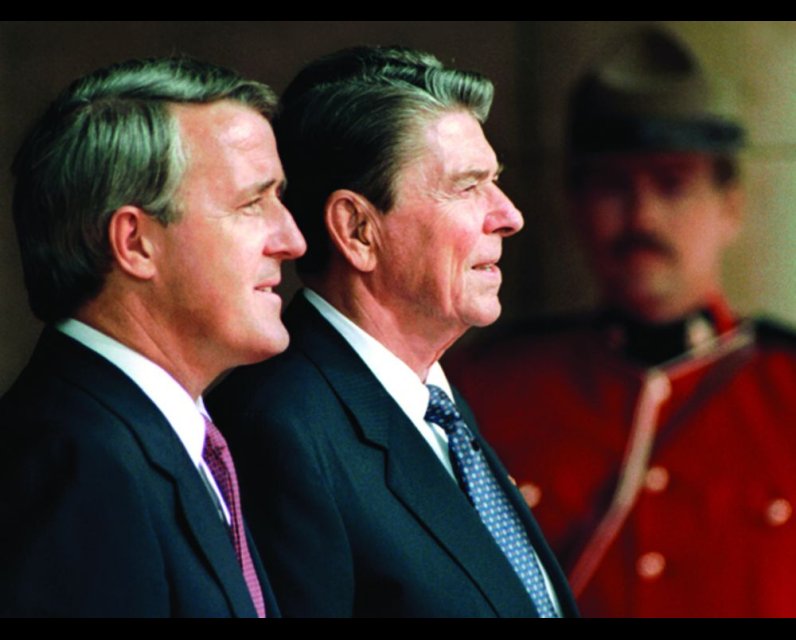Here's how much Ronald Reagan hated tariffs, in his own words

There is arguably one problem with Ontario Premier Doug Ford’s TV ads using the words of Republican icon Ronald Reagan against Donald Trump: It didn’t quote the Gipper enough.
Reagan offered enough quotes about the dangers of tariffs and protectionism to fill an hour or more on Fox News. Some of them are even more devastating to Trump’s cause than those chosen by Ford.
For example: “Protectionism has no future; It’s a dead and discredited idea.” Reagan said that in a speech in 1988.
Here’s another: “(The Canada-U.S. Free Trade Agreement) will send a number of messages. First and foremost, it is a resounding ‘no’ to those who would stand pat, to the naysayers, and to the fearful who advocate protectionist barriers. It is a resounding vote of confidence in our own abilities to meet world competition with an unleashed ingenuity, which is prized on both sides of the 49th parallel.”
Ford pulled the ads from American television stations after a few days after Trump said he’d raise tariffs on Canada another 10 per cent.
But the 40th president’s historical record is so extensive in this area, that if the nine other premiers wanted Reagan to star in their own ads, there’s enough to go around for everyone.
Here are some more:
Speaking to Canada’s Parliament, March 11, 1981:
This relationship has grown to include some of the strongest economic links among the nations of this Earth… Our joint trade… is greater than the gross national product of some 150 countries… Not only is the vast bulk of this trade conducted between private traders in two free economic systems, but more than half crosses our borders duty-free. Our seaways, highways, airways, and rails are the arteries of a massive, interconnecting trade network which has been critically important to both of us. Thus, while America counts many friends across the globe, surely we have no better friend than Canada…
Sustained prosperity in an era of reduced inflation will also serve worldwide to help all of us resist protectionist impulses. We want open markets. We want to promote lower costs globally. We want to increase living standards throughout the world.
Remarks at the official ceremony welcoming him to Ottawa, April 5, 1987:
No two countries in the world… have as great a range of trade and investment exchanges at all levels — from an individual’s vacation trip to a mammoth contract for electric power — as the United States and Canada. No two countries trade more with each other. No two countries invest in each other’s industry or engage in leisure activities in our neighbour’s playgrounds to the extent that we do. And the citizens of both our countries — as businessmen, farmers, workers, and consumers — have benefited accordingly.
Speech to Canada’s Parliament, April 6, 1987:
Prime Minister Mulroney’s proposal would establish the largest free trade area in the world, benefiting not only our two countries but setting an example of cooperation to all nations that now wrestle against the siren temptation of protectionism. To those who would hunker down behind barriers to fight a destructive and self-defeating round of trade battles, Canada and the United States will show the positive way. We will overcome the impulse of economic isolationism with a brotherly embrace, an embrace, it is not too much to hope, that may someday extend throughout the Americas and ultimately encompass all free nations.
Statement upon signing the Canada-U.S. Free Trade Agreement, Jan. 2, 1988:
This comprehensive agreement will benefit many sectors of the U.S. economy. Canadian and American tariffs will be phased out completely, saving consumers hundreds of millions of dollars while also improving our export opportunities. It will secure access to Canada’s market for American manufacturing, agriculture, financial services, and high technology; improve national security through energy sharing; and provide important investment opportunities.
Radio address on free trade with Canada, Jan. 9, 1988:
We will be an example to all the world of what free people can accomplish and demonstrate, that the path to economic growth, job creation, and security is through negotiation and cooperation, not protectionism.
Welcoming Prime Minister Brian Mulroney to the White House, April 27, 1988:
We shall show by deed and dedication…that the lowering of tariffs and trade barriers is the way to a more prosperous world. Protectionism is out, and trade expansion is in.
Toasting Prime Minister Brian Mulroney at a State Dinner at the White House, April 27, 1988:
The (Canada-U.S. Free Trade Agreement) will become one of the most important achievements of my tenure in Washington… We are unshackling our trading relationship in a broad-based effort to make our two countries more prosperous at home while making ourselves more competitive abroad. We’re players in a world economy, and our free trade agreement will help make us the world-class competitors we must be.
Speech to the American Coalition for Trade Expansion with Canada, June 16, 1988:
Protectionism has no future; it’s a dead and discredited idea. In a global economy, there can be no surer way of impoverishing ourselves than to try to make America go it alone, by cutting us off from trade and investment with the other countries of the world. The protectionists make me think of the story of that Sunday school teacher who asks her class, “Who wants to go to heaven?” And all of the children raise their hands except for one little boy in the back of the room. The teacher, astounded, says, “Charlie, don’t you want to go to heaven?” And he says, “Yep, but not with this bunch.”
Signing the Canada U.S. Free Trade Agreement Implementation Act, The White House, Sept. 28, 1988:
This agreement brings down the tariff walls between our two nations and, in so doing, creates the world’s largest free-trade area. Businesses and consumers in both our countries will have unprecedented freedom to choose among a staggering array of goods and services. It’ll mean lower prices for consumers, jobs galore for workers, and new markets for producers… It means a stronger and freer marketplace for the United States and Canada. There’ll be a rich flow of agriculture and energy resources from one country to the other in a way that will profit both. We also deal with the service sectors of our economies, providing for the first time an explicit assurance that in such areas as accounting, tourism, insurance, and engineering our peoples will be free to choose their suppliers.
Public historian Arthur Milnes of Kingston served as the memoirs’ assistant to the Rt. Hon. Brian Mulroney, and was a speechwriter to then prime minister Stephen J. Harper.
Our website is the place for the latest breaking news, exclusive scoops, longreads and provocative commentary. Please bookmark nationalpost.com and sign up for our newsletters here.



Comments
Be the first to comment